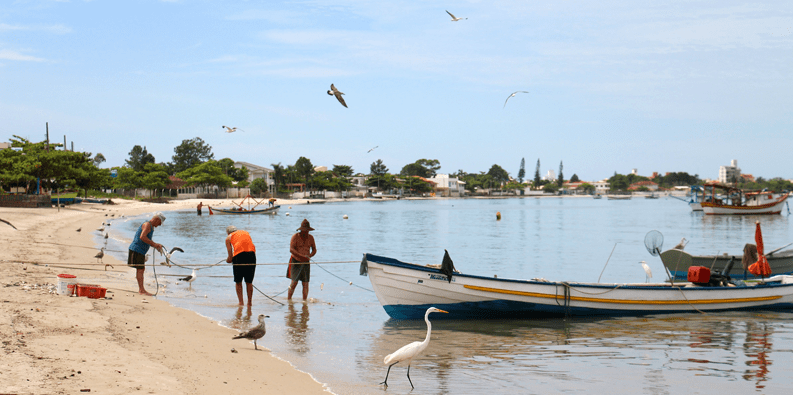Fanny Vessaz is an MSc graduate of marine biodiversity and conservation from the Federal University of Paraná in Brazil. She was a recipient of one of our MSC scholarship program grants in 2014. Her research involved assessing bycatch reduction devices in the southern Brazilian artisanal seabob shrimp trawl fishery. Here she reports on the importance of collaboration and why bycatch is a complex topic where fishing communities’ voices need to be heard.
Brazil is a highly diverse country, and its fisheries are similarly varied. Even among small-scale shrimp fisheries, the methods used can differ drastically, but regulations covering them don’t. Over the course of this year, I have been exploring the dynamics of a small-scale shrimp trawl fishery in southern Brazil and examining the issue of bycatch (the unintentional catching of marine animals that are not a fishery’s target species).
In an effort to make the fishery more sustainable and mitigate the loss of valuable proteins through discards, a project to implement Bycatch Reduction Devices (BRDs) is already ongoing. BRDs are modifications of fishing gear to exclude bycatch either by size selection or by taking advantage of different species’ swimming abilities.
What bycatch means for fishers
To be effective, BRDs have to be adapted to an individual fishery’s characteristics and repeatedly tested. However, there is a further dimension to the issue: human interaction. In small-scale fisheries, the opinions of fishers are often neglected by common management systems, yet they can play an important role in determining the relevance of bycatch mitigation strategies.
Bycatch can enhance food security or provide an alternative income source. This is the topic I focused on since arriving in Brazil. Along with a fellow student I visited fishing communities to investigate the patterns of bycatch use and fishers’ perceptions on bycatch reduction.
January-February 2014 Immersion
Small-scale fishers often have to undergo regulations which haven’t been adapted to their situation and are implemented without their consultation. There are even cases where fishers have willingly shared their knowledge and are still subjected to ill-fitting new regulations. Amid this atmosphere of distrust, we arrived in a small fishing town in a car labelled “Federal University – Official Car” making us appear like government agents visiting to check up on the fishers. Luckily, one fisher already knew us and, through quality time spent among them, others opened up.
Among the fishers we learned the huge importance of immersion in local context, of sharing daily routines and creating real relationships. There is an incredible amount of information that cannot be communicated through standard interviews, so we kept our eyes and ears open.
Through this immersion my primary objectives were more than fulfilled. Now my mission back in the office was to accurately convey the information gathered and evaluate the relevance of bycatch mitigation strategies for this fishery. In summary: some of larger fish caught by the fishery as “bycatch” are important for consumption and also yield significant economic benefits for some fishers. So, a BRD aimed at only excluding smaller-sized organisms and juveniles, via as escape panels for example, would be a suitable option for testing in this fishery.
March – April 2014 – Workshopping
In fisheries management, collaborative approaches have been shown to enhance the development of adequate regulations and encourage greater compliance. If methods are adapted to local needs, the outcomes are usually positive and sometimes unexpected, leading to some innovative solutions. Besides, fishers’ knowledge is valuable to integrate with scientific data, especially when the latter is lacking or difficult to collect. Gathering monitoring data is also much easier when fishers are participating.
For our project, we organised workshops in two different fishing communities to collectively develop suitable strategies. The main objective was to reach a consensus on the most appropriate BRD to be tested in the area.
Going back to school
We presented results from previous experiments with BRDs conducted in southern Brazil and discussed the best alternative, considering the local socio-economic dimensions associated with bycatch (i.e. sale, consumption). Our venue was a primary school and some fishers commented that it was like returning to their youthful studies. Significantly though, fishers and researchers worked and learned together.
During these workshops I realised how much knowledge fishers have and are ready to share, including ideas on adapting BRDs. They were also eager to learn the results of previous experiments, while remaining quite suspicious about them. Interestingly, the results for shrimp catches with tested BRDs were considered too low (although they corresponded to catch values for a “good fishing day” as indicated by the same fishers some days earlier). In contrast, figures for bycatch were much too high according to them, as if it was not possible to discard so much. Yet, in the second workshop, one fisher recognised that large quantities of bycatch were thrown overboard and represented a significant waste.
Collective solutions
Overall, few fishers acknowledge the ecological impacts of discards. When trying to gain acceptance of bycatch mitigation strategies, long-term benefits like preservation of fishing stocks are likely to have less impact than short-term economic benefits. This is the challenge that researchers face – developing incentives that resonate with fishers day-to-day socio-economic concerns. For instance, loss of valuable bycatch with BRDs could be offset by the catch of bigger shrimps, as several fishers themselves observed during our workshops.
The take-home message here is the importance of the research approach. A participatory process builds trust between fishers and researchers; it creates an open platform where ideas can be shared and solutions can be developed collectively. Most importantly, fishers’ concerns are seriously considered, thereby avoiding unfitting management strategies and lack of compliance. The role of researchers as bridges between the often conflicting sides of management and fishers is essential. Eventually, it can lead to alternative approaches such as adaptive co-management – a constant process of learning-by-doing where all stakeholders are involved in the decision-making. This in turn will produce better-accepted and more sustainable long-term fishing strategies.

